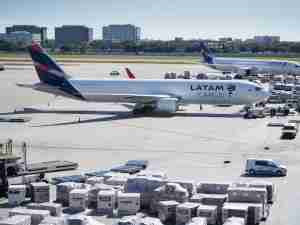JetBlue Airways Corp. is acquiring deep-discounter Spirit Airlines Inc. for at least $3.8 billion in cash, clinching a deal less than a day after Spirit called off a planned merger with Frontier Group Holdings Inc.
JetBlue will pay $33.50 per share for Spirit, or as much as $34.15 depending on timing, the airlines said in a joint statement Thursday. That includes a $2.50-a-share prepayment once Spirit stockholders approve the deal agreed to by the airlines’ boards, they said.
The agreement caps a more than three-month battle by JetBlue to derail the Spirit-Frontier deal and secure a chance to expand its own network, fleet and access to pilots. While Spirit’s board had stood by the rival Frontier proposal, that $2.6 billion stock-and-cash deal collapsed late Wednesday after the companies failed to garner enough shareholder support.
“We want to get this deal done,” JetBlue Chief Executive Officer Robin Hayes said in an interview, noting his company’s plans to divest some assets to help win approval from skeptical regulators. The carriers will operate independently until after receiving regulatory approval and the transaction closes, which the companies expect no later than the first half of 2024.
JetBlue is banking on the combination to give it sufficient scope to effectively influence pricing against the nation’s largest airlines, which control about 80% of the US market. The carrier aims to lure away their passengers with lower fares and a nearly comparable onboard product. A merger would cement JetBlue as the fifth-largest carrier in the US based on domestic passenger traffic.
Spirit shares rose 3.5% at 9:52 a.m. in New York, while JetBlue fell 1.2%.
Upfront Cash
Hayes kept Spirit shareholders out of the arms of its ultra low-cost competitor by offering more cash, upfront dividend payments and a breakup fee if antitrust regulators intervene -- something which could derail a merger.
The final deal largely matched JetBlue’s last public offer for Spirit, with the exception of an increase in that breakup fee to $470 million from $400 million, with a portion being paid to Spirit itself and the rest to shareholders.
“Absolutely it was important, and JetBlue recognized that,” Spirit Chief Executive Officer Ted Christie said in an interview of the unusual fee.
The Biden administration has pledged to more thoroughly scrutinize mergers to assess their market concentration and value to consumers. JetBlue has said it would be willing to give up Spirit assets in New York and Boston, and possibly at other crowded airports, to help secure approval.
JetBlue already faces opposition from the Justice Department, which has sued to break up its commercial agreement with American Airlines Group Inc. The regulators allege that partnership -- which targets the New York and Boston markets -- is anticompetitive.
Northeast Alliance
Spirit had rebuffed earlier offers from JetBlue based in part on a demand that its suitor abandon the so-called “Northeast Alliance” with American to improve chances for its own combination.
Hayes has pledged to convert Spirit’s ultra-discount business model to its own, which features low fares and customer-friendly service like free Wi-Fi. The company also plans to shift Spirit’s employees to its higher pay scales and convert Spirit’s jam-packed planes to a more roomy seating arrangement. That’s all expected to boost costs at JetBlue, which historically has struggled to control operating expenses.
The combined carrier will be headquartered in New York.








